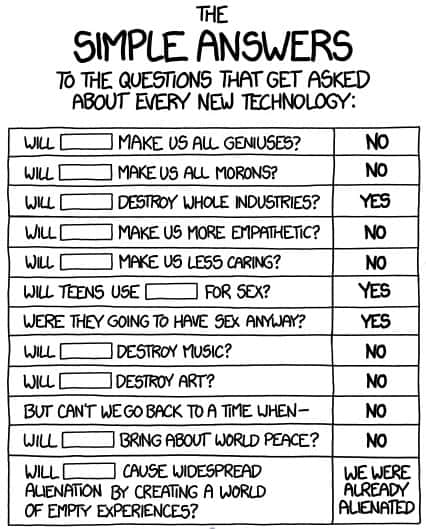Will [] Make The World Better?

Comic from XKCD.
I recently visited Singularity University and one of many examples of disruptive technologies discussed was the self-driving car. There’s a race to get a product to market in which many players are trying to be first. Regardless of the timeline, these vehicles will hit the roads sooner than we realize. And years from now we’ll look back and remember the times we had to actually hold the steering wheel and push the pedals to drive a car.
My son, who is 7 years old, likely won’t learn to drive a car (at least in the way we think of driving today). He’s aware of that and actually looks forward to it. At least once a week, he’ll ask me if autonomous cars are already for sale. Growing up with tablets, Minecraft, Bitcoin, drones, etc., his generation can accept that the coolest things imaginable are possible. Cars that drive themselves? Sign him up!
We adults are attached to the old ways and usually skeptical, but still less so than previous generations. Fly back to the 70’s and tell your grandparents about cars without drivers and they would think you’ve been hanging with the hippies.
However, the expectation of unexpected new technologies shouldn’t be the only new norm. We want new generations to expect (and demand) the effects of new technologies to cause a positive impact in the world. These are the technologies that excite us at Collaborative Fund.
Make cool things…but cool things that turn the world into a better place.
Stemming from the popular webcomic that made the rounds earlier this week, my hope for the future is that the question of whether a new technology will make the world better will have a simple answer.
Discuss on our subreddit.